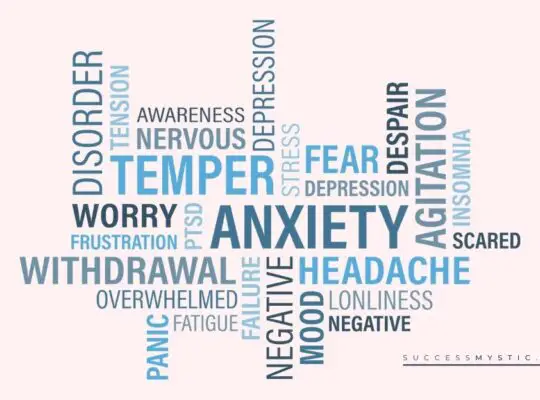For most of us, the idea of confronting someone about a problem we have is enough to trigger a flood of feelings. And when you imagine yourself sitting across from that person, talking about something that has been bothering you or causing you pain, you can’t help but get emotional just thinking about it.
You don’t want to get emotional in front of them, but you can’t see a way to resolve your problem without confronting the situation. So, what are you to do?
You do not have to choose between staying in control of your emotions or finding a resolution to your conflicts. You can have both. You just need to learn to manage your feelings more effectively while asking for what you need. This guide can help you learn some effective strategies for asking for what you need while keeping your emotions in check.
Understanding Conflict
For any relationship you have in your life, there will be conflict from time to time. You will not always agree, and you do not have the exact same needs or goals. For some of us, conflict raises strong emotions, and even for the rest of us, conflict is never enjoyable or wanted. Instead of trying to avoid conflict or just ignoring a situation until a significant problem exists, you can instead learn how to resolve issues and disagreements in a healthy, productive way.
What do we mean by conflict? Conflict is not just a disagreement. These are circumstances or situations where you or the other person perceives some type of threat, whether to your body or your emotions.
Because of this, conflict triggers an emotional response, and it is often one that you feel little control over. Your perceptions of conflict, including what causes it and how it influences how you feel, start very young in life, and are influenced by your experiences, values, culture, and much more.
Any type of conflict needs to be resolved. Without a resolution, the perceived threat you feel will begin to interfere with your mental, emotional, and physical well-being. They stay with you, lingering in your mind and weighing on your heart until they are addressed.
Because conflicts generate emotions. Those with less ability to manage their feelings will be more uncomfortable with these types of situations. Learning how to manage your feelings, cope with stress, and identify the sources of your perceived threat are crucial for learning to resolve these types of problems.
The Common Causes of Conflict
You can feel conflict with someone over all sorts of difference. Even when the differences appear to be small or meaningless, it can still result in intense emotions for you or the other person. Behind all conflict is an emotional need at its core. Sometimes, it may be hard to see the connection between the situation and this need, but the longer you look, the clearer it can become.
When conflict arises in any relationship, regardless of the nature of the connection, it is critical to address because only then can you both value the needs of the other party, which is vital for the health of any relationship. We all deserve consideration and respect, which are at the very heart of conflict resolution.
To start to resolve conflict and successfully manage your emotions surrounding this rift, you first need to understand the issue at hand. Most disputes generally fall into one of three broad categories.
The first category of conflict occurs because of misunderstanding. This type of conflict arises either when one person has incorrect information or when two people have different information. In these conflicts, the two people are not operating from the same starting point or cannot understand the other person’s ideas or views because their foundations are fundamentally different.
And while it may seem like it should be easy to resolve this, people often become entrenched in their ideals because of what they initially believed to be true, and conflict can continue because of a lack of trust, embarrassment, hurt feelings, and a wide range of other consequences.
Some conflicts arise because two or more people have a difference of opinion about a specific topic. These differences could stem from believing certain facts to be more relevant than others, whether something is urgent or directly influences your life, or because of personal values and beliefs.
Most people are overly attached to their opinions, and conflicts that stem from this category may be harder to resolve. The focus should be on finding a resolution that allows the two of you to live with the outcome, not on who is “right” or “wrong.”
In the final category, it is someone’s behaviors that are the source of conflict. Those actions are having a direct influence on you, and you may feel hurt, betrayed, angry, or some other emotion because of how this person is treating you.
When trying to resolve conflicts of this nature, you must remember to separate the person from the activity. You are not upset with them; you are upset with their behavior. Your resolution is about finding a better choice of action that makes you both more comfortable.
There can be conflicts that fall into more than one category. For example, a misunderstanding can lead to an action, which then causes conflict. Or a difference of opinion causes you to view someone in a certain way, which can lead to misunderstanding or hurt over specific actions.
Conflicts that arise from differences in goals, communication styles, and interests can fall into any of these categories, depending on how they manifest in your personal relationship and the nature of your interactions. Work conflicts will likely affect you differently than those with romantic partners, friends, or family.
When you can recognize the source of your conflicting needs, you can start to solve the problem using empathy and understanding. But, to know why a particular issue or situation is affecting you as it is, you need to have enough emotional awareness to examine your problem.
Understanding Emotional Awareness
Your emotional awareness is what allows you to understand not only yourself but also others. Emotional awareness is what allows you to know why you feel specific emotions, to identify your exact feelings, and to effectively communicate about your feelings with others. In short, emotional awareness is crucial for resolving conflicts and solving disagreements.
Many people are taught that having strong emotions is bad or that they should not talk about how they feel to other people. This type of suppression makes it challenging to manage strong emotions or understand the sources of feelings like fear, anger, or sadness. When you do not know what you are feeling or why you are feeling that way, it is nearly impossible to come up with a solution that will help you move forward and feel more positive in the long run.
Being more connected with your feelings is vital for resolving any sort of conflict, whether at home, in the office, or in your personal relationships. And avoiding strong emotions is a sure-fire way to create conflict in your life. Being conscious of your emotional experience in every moment of your life is what allows you to manage your feelings, express them appropriately, and identify solutions that will enable you to resolve negative emotions.
Emotional awareness includes your ability to:
- Know yourself and identify what is troubling you
- Figure out what is bothering other people
- Communicate your needs clearly to others
- Have empathy for others’ emotional needs
- Remain motivated to resolve conflicts that are affecting you or the ones you love
Learning to be more emotionally aware starts with learning to identify the various emotions you are having as well as what is the probable cause for how you feel. Because strong emotions interfere with your ability to think clearly and rationally, they play a significant role in all conflicts.
The more emotional you are during a conversation with someone, the less productive it is likely to be for either of you. The more wrapped up you are in how you are feeling, the less likely you will be to see a clear resolution or to be happy with any that are presented to you.
How emotionally aware are you?
Do you find that your emotions often run out of control or seem to guide all your decisions in life?
Do your feelings produce physical responses in your body?
Do you often ruminate over your feelings and hold on to negative emotions for extended periods?
How adept are you at recognizing various emotions in others?
Learning to be more emotionally aware and to manage your feelings is a skill you can learn, and the strategies that are explored below can help you with learning to become more in control of your emotions.
Understanding Your Own Resolution Skills
Think about a time in your life when you had a genuine conflict with another person. What was your initial reaction to this turmoil? Did you face it head-on or did you avoid it all costs? How long did the conflict last before you attempted to resolve it, or did you just ignore it until it or the other person went away?
Our ideas about conflict are born in our earliest years and are continuously informed by all our relationships since. If your models as a child had unhealthy ways of finding solutions to their problems, you are much more likely to rely on these, as well.
Many people have extreme emotions attached to their beliefs about conflict, including feelings of humiliation, demoralization, fear, or rage. Depending on how powerful you felt in your earliest conflict, confronting someone at this point in your life may even feel traumatic to you.
The more you avoid conflict, though, the more conflicted you will feel. Many times, though, when we attempt to respond to a specific conflict, our perceptions either about the actual situation or the other person has been skewed by the emotions we are feelings surrounding the rift. Feelings are a powerful lens that can color how we view others’ motives and actions and even facts with which we are presented.
14 Strategies for Managing Emotions During Conflict Resolution
When you are in the midst of a tense discussion, it can be hard not to get emotionally overcharged. Conflict feel like threats, so our brains lash out to protect us from harm, which often involves strong feelings and emotional words or actions. Fear is guiding your mind, but you can learn how to calm that anxiety and tame your emotions so that you can find a resolution to your problem.
You can learn to interrupt this fear response, to better manage your emotions, and to have a healing, productive conversation that moves toward a resolution. From learning to manage your stress to finding ways to ask for what you need, here are our top choices for conflict resolution tips that help you keep your emotions in check.
1| Use Deep Breathing
This is perhaps the simplest but also the most effective tool in your emotional management arsenal. In any tense situation, you can always access your breath to help calm you and focus your mind. Deep breathing slows your respiration and heart rate and can help you relax tension throughout your body. When you notice that your emotional response is becoming intense, focus on your breath.
Feel the air as it passes into your nose, down your airway, and into your lungs. Feel your diaphragm contract as your lungs expand. Count each breath and try to exhale as slowly as possible. Breathing is highly effective and gives you time to slow down the conversation and regroup when emotions start to run high.
2| Name Your Emotions
When you are learning emotional management, it is imperative that you not only acknowledge feelings as they are happening but that you learn to name them as well as the thoughts or actions that are a result of these emotions. When you are in the midst of turmoil, you can get so hung up on what you feel that it crowds out everything else in your mind.
Instead, when you learn to label things (This person has treated me in this way, which is making me feel disrespected, which is causing me to be angry at them), you slow the process down and allow yourself to take a step back.
You can actually see your thoughts and feelings in your mind, which helps you figure out how to solve the conflict. Putting distance between your emotions and the thoughts or actions they are inciting is also extremely helpful. It makes them easier to let you because you have acknowledged them.
3| Watch Nonverbal Cues
In the middle of a conflict, you may be missing some essential information from the other person, or you may be communicating unintentionally. Body language, facial expressions, and other nonverbal cues are vital sources of meaning in a discussion, and when you learn to pay attention to these, especially when emotions are starting to run high, you can learn a great deal.
When you focus on what someone’s posture, gestures, and tone are saying, you can respond in ways that show them you do understand their perspective, and it can help you resolve the problem more easily. Your own emotional awareness will play a key role in your ability to read other people’s nonverbal communication.
The more aware you are of your own emotions and how they manifest in your communications, the easier it will be to identify these in others. Using your cues to enforce your message of compromise, empathy, and caring is crucial for the healthy resolution of your conflict.
4| Repeat Their Words
When the other person is emotionally charged, it can sometimes help to mirror their words back to them. Many times, people become emotional because they want to be heard or understood. When you repeat what you just heard them say, it shows you are listening and that you are interested in understanding their perspective.
When you hear your own words said back to you, it can sometimes open your eyes to how you are really feeling, too. Mirroring their emotions as well as their words can provide you with great insight into the real source of your situation.
5| Allow the Other Person to Express Their Feelings
When you conflict with someone, it is not just you who is upset. The other person in your situation may be also experiencing strong emotions. When they express themselves, listen. Allow them the opportunity to vent, which may not be easy but is necessary for them to work through their feelings.
Because you already worked through your emotions before you confronted them, the other person may feel blindsided or unprepared, so allow them some time to process and explore their feelings. Listen but do not engage. They will wind down if you do not project negativity back to them.
6| Be Responsible for Your Own Emotions
Do not resort to blaming others for your emotions. You can express how you feel using “I statement,” but these are not meant to shift the responsibility for how you feel. You cannot control other people or how they behave. But you can manage your reaction to them and your own process for coping with this.
Confronting the problem allows you to ask for a resolution that helps you live with the situation, so you are taking action. But do not resort to shifting the blame to others for your feelings.
7| Try Moving Around While You Are Talking
Movement can allow your brain to focus on something other than your emotions, making it less likely you will lose your cool while confronting someone. While it may not be appropriate to suddenly stand up in a seated meeting, ask the other person if they mind if you walk around the room while you talk. I
If you are not comfortable enough to do this, you can focus on moving other parts of your body to distract your mind. Mindfulness techniques like clenching and releasing various muscles or grounding your feet into the floor can be helpful during tense conversations.
You can try counting each of your fingers or toes by touching them to leg or the inside of your shoe, as well. These will help you ruminate less and focus more on the conversation that needs to be had.
8| Have a Plan to Cool Down
Before initiating a hard conversation with someone else, give yourself an out in case you need to take a break or walk away to gain composure. Prepare what you will say if your emotions start to run high and know that it is okay to revisit this discussion at another time. It is more productive to walk away and gain your composure than to engage in an emotionally charged argument where all you can focus on is how you are feeling.
9| Make More Frequent Requests
When someone is doing something that causes you to feel angry, practice making requests that will resolve the situation. The more often you do this in your everyday life, the more easily you can do this when the stakes are much higher. If your spouse keeps forgetting to take out the trash and you are about to blow your top, instead of yelling or allowing your anger to boil over, make a request that will resolve the situation.
This will solve the problem and avoid you stewing in your own emotions for days or weeks to come. The more comfortable you are asking for what you need in smaller situations, and not allowing your emotions to take over, the easier it will be when you need to have more difficult discussions.
10| Notice What Their Emotions Tell You
If your counterpart in your conflict is also emotionally charged, recognize that this is an opportunity. They are clearly invested in the situation, as well, or else they would not care so much about what you are asking. When you notice strong emotion from them, embrace this as a reason to find a mutually agreeable solution, and to move forward productively.
Be sure to listen carefully and to express empathy for how they are feeling and what they are requesting of you. If they are struggling to express themselves but are visually upset, use your preparation skills to help them share what they are feeling and possible sources of those emotions.
Share that their feelings are legitimate, encourage them to identify what they are feeling, paraphrase what you are hearing, and encourage them to see how emotionally committed you both are to finding a resolution.
11| Don’t Avoid the Face-to-Face
One way people often try to avoid conflict is by choosing to share emotions only via email, texts, or voice mails. Anything to avoid a real discussion seems better in many people’s minds. However, this is not the case. Negative emotions or stressful situations cannot be resolved successfully in this way.
And written text leaves a lot of room for interpretation that can actually make the situation worse instead of better. A live conversation is the simplest way to resolve conflicts, so do not avoid the necessary because it makes you uncomfortable. Embrace the opportunity to clear the air and move forward productively.
12| Pick a Mantra
If you fear losing your calm, select a mantra that you can repeat to yourself to remind you to remain composed. Depending on the situation, your mantra should remind you what you are there to do or to avoid the triggers that are likely to cause you to blow your top.
Repeat this inside your mind while you are talking through the conflict, but it is helpful to practice this beforehand, so you are comfortable with it and remember its purpose in the heat of the moment. Mantras can include “This is not about me,” “This is for the good of our relationship (or the team),” and “Focus on what matters.”
13| Don’t Be Afraid to Take a Break
If you notice that your conversation is not proceeding productively or either of you are too emotional to think rationally, then don’t be afraid to ask for a breather. Ask if the other person would like some water or a coffee.
Excuse yourself to go to the bathroom. Taking just a few minutes apart can give you both time to regain your thoughts and prepare to be more effective when you return to the conversation. Breaks are great for all types of conflicts, especially at home.
14| Be Careful About Jumping to Conclusions
Conflicts are usually much more complicated than they first appear, so be sure that you are not making any judgments or coming to any solutions before you have thoroughly heard the other person. While it may seem obvious to you what the problem is, there may be many factors that are influencing the situation of which you are not aware.
Be sure you hear all side and to consider all these variables before suggesting ways to resolve the conflict. Gathering facts and evidence is a crucial step in solving problems, and it is one that we often overlook in our haste to simply get to a solution.
Final Thoughts
Learning a few emotional awareness techniques and focusing on the right things during conflict resolution are the key to getting what you need without losing your cool.
While having strong emotions about a particular situation can tell you something is wrong, they should not guide the resolution of your circumstances, as those feelings can cloud your judgment and make it hard to resolve anything productively. Using the strategies suggested, you can learn to manage your emotions while still asking for what you need.







